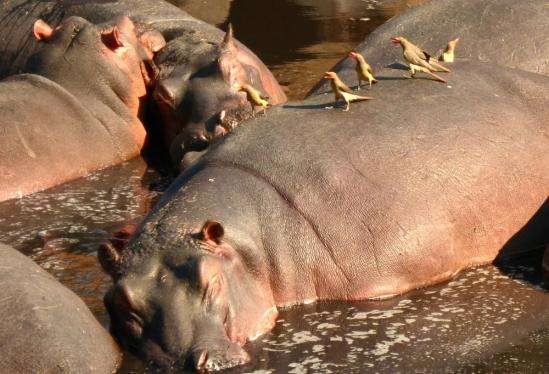Hippo dung provides important nutrients to river fish and aquatic insects

The common hippopotamus can spend up to 16 hours a day immersed in rivers and lakes. Lumbering out of the water at night, these herbivores graze on tropical grasses and consume 80 to 100 pounds in one meal.
By daybreak, having eaten their fill, they return to their daytime resting area to rest, digest and, eventually, eliminate. This natural process results in millions of tons of hippo dung entering Africa's aquatic ecosystems every year.
However, as distasteful as that might seem, the hippos' deposits actually serve an important ecological function. A new study by UC Santa Barbara's Douglas McCauley and colleagues reveals that the organic matter produced by hippos is a source of nutrition for a variety of river fish and aquatic insects. The researchers' findings appear today in the journal Ecosphere.
"The ecological importance of hippopotamus-vectored subsidies has been widely speculated, but we use tools from chemistry to directly demonstrate that these hippo nutrients are being directly picked up and used by aquatic animals," said McCauley, an assistant professor in UCSB's Department of Ecology, Evolution and Marine Biology.
"Ecologists are really interested in how materials and energy flow across ecosystems, and here is a very clear boundary—aquatic versus terrestrial," he added. "These two worlds are clearly distinct, but our research shows that wildlife such as hippos build important connections across these ecosystem gaps. Our study confirms that hippos are bringing a part of terrestrial ecology—nutrients and energy—into this other domain of rivers."
McCauley's team found that some species of river fish—both in their native habitat of Kenya's Ewaso Ng'iro River and in the laboratory—fed on the nutrients from hippo dung. The scientists were able to use stable isotopes, a class of natural chemical markers, to trace the flow of organic matter through the food pipeline, from the back end of the hippo to the tissue of river fish and insects. The results demonstrate that these aquatic consumers absorb nutrients from hippo dung as part of their diet.

An additional discovery showed that the importance of the hippo as a food source is contingent on the conditions of the river. For example, the researchers found that the uptake of nutrients from hippo-vectored organic matter was most pronounced during periods of low river flow, which were caused by seasonal changes in rainfall.
"When the river is high, it seems to be diluting a lot of the material that the hippos are bringing in and the animals in the river just can't get to it quickly enough," McCauley explained. "And when it's dry, these materials concentrate in these pools and the animals are able to make better use of them."
These findings are important not only because they characterize the importance of hippos in the river food web but also because rivers in East Africa are changing rapidly. "Climate change and regional development are certainly changing river flow," McCauley said.

"With hippo populations declining in Africa and water regimes changing rapidly, it is critically important that we understand more about the ecological role of hippos," he added. "The linkages that we highlight in our research illustrate that the fate of the hippo is intimately linked to the fate of whole food webs and to the functioning of entire ecosystems."
The stars of this research can be viewed live via a webscam focused on a hippo pool that served as one of McCauley's main research sites.
More information: Ecosphere. www.esajournals.org/doi/10.1890/ES14-00514.1
Journal information: Ecosphere
Provided by University of California - Santa Barbara


















